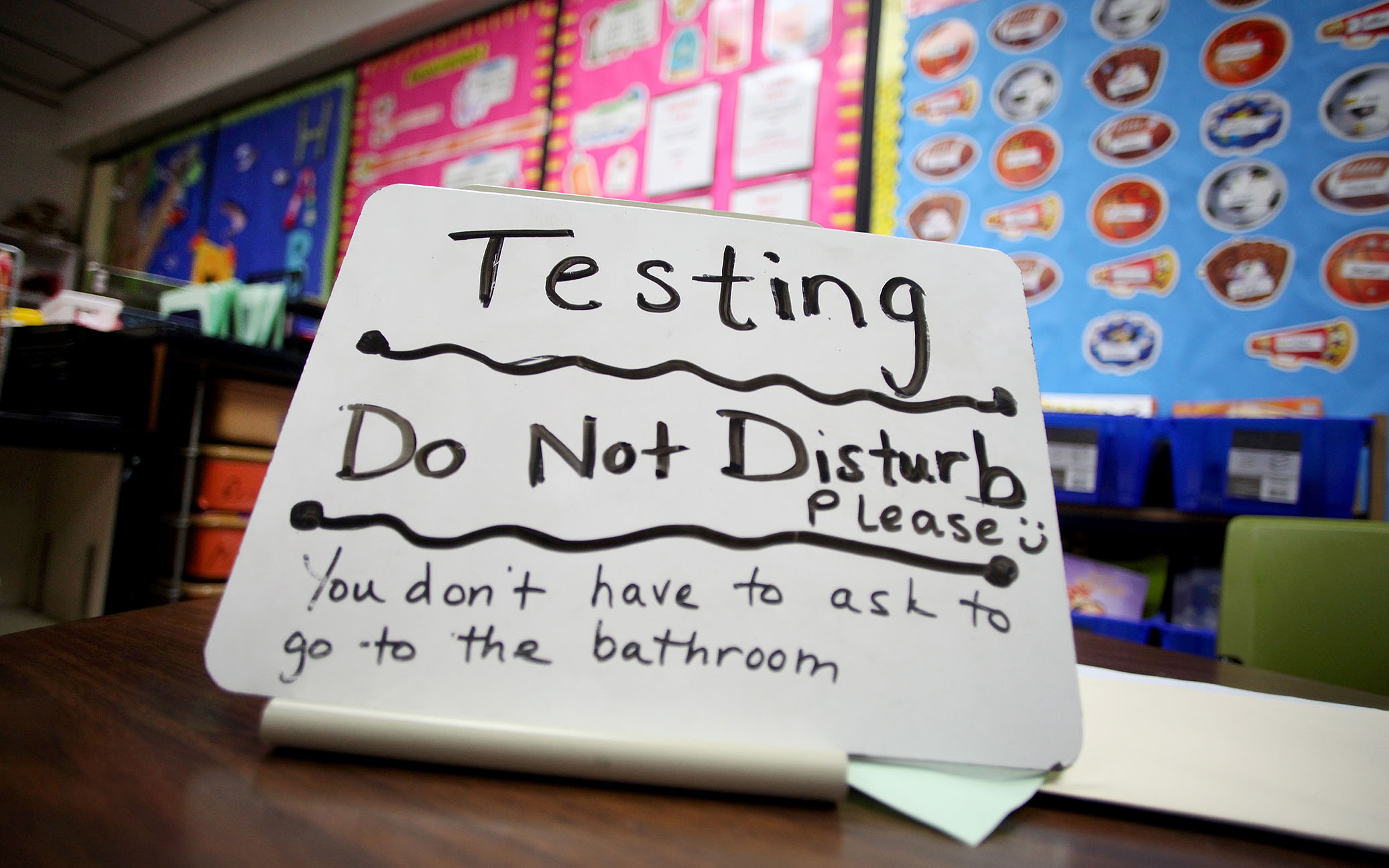Advocates are elevating issues in regards to the variety of college students with disabilities taking less-rigorous standardized assessments. (Chuck Berman/Chicago Tribune/TNS)
Solely a small proportion of scholars are purported to take alternate assessments supposed for these with probably the most important cognitive disabilities, however new proof means that states are routinely exceeding the restrict regardless of main ramifications for youths.
Below the federal Elementary and Secondary Training Act, not more than 1% of all college students — or about 10% of these with disabilities — who’re assessed in a state annually are allowed to take what’s often called an alternate evaluation aligned with alternate educational achievement requirements, or AA-AAS. The modified assessments are much less rigorous than the final, grade-level studying and math exams mandated for most youngsters.
Whereas the cap has been in place for the reason that 2017-2018 college 12 months, 33 states stay out of compliance, in line with a report out this month ready by The Advocacy Institute, The Nationwide Down Syndrome Congress, Nationwide PLACE, the Middle for Learner Fairness and the Council of Mother or father Attorneys and Advocates on behalf of the Consortium for Constituents with Disabilities.
Commercial – Proceed Studying Under
Among the states violating the rule requested a waiver from the U.S. Division of Training to exceed the restrict, whereas others went over the cap with out a waiver, the report discovered.
Because of this, the advocacy teams observe that a whole lot of hundreds of scholars with disabilities are inappropriately being given much less rigorous assessments. In California alone, coming into compliance with the rule would imply lowering participation in alternate assessments by 10,000 college students, the teams stated.
“We all know that when college students are educated by completely different pathways, it leads to very completely different ends,” stated Denise Marshall, CEO of the Council of Mother or father Attorneys and Advocates, or COPAA, a nonprofit that advocates for the rights of scholars with disabilities and their households. “If college students are inappropriately given the alternate evaluation they seemingly is not going to graduate with a daily highschool diploma or entry to postsecondary packages, each of which result in fewer employment choices.”
Marshall stated that the report was ready because the advocacy teams plan a gathering with the Training Division to relay issues about widespread noncompliance with the 1% cap.
The report particulars lax enforcement from the Training Division noting that the company has routinely failed to carry states requesting waivers to the requirements required by legislation. Additional, it says the division has imposed no penalties when states have been denied waivers and has taken restricted motion when states have exceeded the cap with out a waiver.
“This method to monitoring the 1 % cap provision of ESSA seems to be having restricted effectiveness,” the report signifies.
Eight states have constantly obtained letters from the Training Division after exceeding the cap with out a waiver, the findings present. Nonetheless, the variety of college students taking alternate assessments declined little and even elevated in a few of these states.
Advocates are calling on the Training Division to ratchet up penalties for states which are denied waivers and those who exceed the cap with out a waiver, amongst different adjustments.
“The 1% safeguard is in place to make sure that any such identification of scholars to be educated based mostly on completely different anticipated outcomes doesn’t result in stigmatization, self-fulfilling prophecies of discovered helplessness and decreasing of educational expectations,” Marshall stated. “For some college students, alternate educational achievement requirements are applicable, nevertheless, with 33 states exceeding the cap, we all know that far too many college students are being assigned to the AA-AAS when they need to be taking the final evaluation, aligned to the common state math and (English language arts) requirements.”
The Training Division stated there was enchancment with the proportion of scholars taking alternate assessments dropping from about 1.25% throughout the 2016-2017 college 12 months to 1.11% in 2021-2022. The company indicated that it has convened seminars, written letters to states which are out of compliance and brought different steps to make sure that college students are taking the fitting assessments. Extra technical help is deliberate this 12 months directed at states with excessive charges of alternate evaluation participation, officers stated.
“The division is dedicated to making sure excessive expectations for all kids with disabilities,” a spokesperson for the Training Division advised Incapacity Scoop. “The division has seen important progress throughout the nation in lowering the proportion of scholars taking an alternate evaluation, and we’re actively working with all states to advertise compliance with the requirement to evaluate fewer than 1% of scholars with the alternate evaluation.”
Learn extra tales like this one. Join Incapacity Scoop’s free e mail e-newsletter to get the most recent developmental incapacity information despatched straight to your inbox.


